Looking for something fresh to stream? Chinese dramas on Netflix remain some of the most underrated shows available right now. While K-dramas and Spanish telenovelas have captured global attention, their Chinese counterparts offer equally captivating stories in Mandarin.
In this post, I'll show you the top 6 C-dramas on Netflix that deserve your immediate attention. Whether you're a language learner hoping to pick up natural Chinese slang expressions or simply someone searching for excellent storytelling, these selections offer the perfect starting point for your Chinese drama journey.
And if you’d like more structured tools (like dual subtitles, interactive transcripts, and learning features designed for Chinese), I'll introduce you to how Lingopie can help.

Top Chinese Dramas On Netflix
Netflix has a great selection of Chinese dramas that are perfect if you’re looking for engaging stories while getting exposure to Mandarin. In this section, we’ll highlight some of the most popular titles currently streaming on the platform.
If your goal is not just to watch but to actively learn the language, though, Lingopie offers its own catalog designed specifically for language learners — complete with interactive subtitles, transcripts, and review tools to make every show a learning experience.
1. The Double (双生花)

This historical drama follows Xue Fang Fei, a woman who survives being buried alive (scary stuff!) and takes on someone else’s identity to seek revenge. Expect lavish costumes, palace intrigue, and plenty of twists that will keep you hooked.
Watching The Double on Netflix exposes you to the kind of formal, old-fashioned language used in historical settings. You’ll notice how characters of different social ranks address one another, which is super insightful for understanding respect and hierarchy in Chinese culture.
2. Handsome Siblings (俊男坊)

Two twin brothers separated as babies are raised to be enemies: one as a villain, one as a hero. When they finally meet, they must decide whether to follow their training or embrace brotherhood. Expect dazzling fight scenes and gorgeous landscapes.
On Netflix, Handsome Siblings introduces you to martial arts vocabulary you won’t find in textbooks. The characters speak clearly and dramatically, which makes it easier for beginners to follow along.
3. Accidentally in Love (惹上冷殿下)

A rich girl runs away from her wedding and goes undercover at college. There she clashes with a famous singer who becomes her deskmate — and their fiery rivalry slowly turns into romance. Along the way, she’s also investigating her parents’ mysterious deaths.
This lighthearted Netflix drama is full of everyday Mandarin. You’ll hear slang, jokes, and casual expressions that young people really use. It’s a great way to pick up conversational Chinese.
4. Yanxi Palace: Princess Adventures (延禧攻略:骊凰令)

This six-episode mini-series follows Princess Zhaohua as she prepares to marry a Mongolian prince, complete with palace intrigue, stunning costumes, and romantic drama.
On Netflix, the dialogue highlights formal titles, polite speech, and respectful phrasing — still very relevant in modern Chinese culture. Because the pace is slower than in many modern dramas, it’s a nice entry point for learners.
5. Wave Makers (波浪)

This Taiwanese political drama takes viewers behind the scenes of a presidential campaign. It doesn’t shy away from serious topics like workplace challenges, gender dynamics, and moral gray areas.
Watching Wave Makers on Netflix helps you tune your ear to Taiwanese Mandarin, where you’ll notice distinct accents and vocabulary compared to mainland Chinese.
6. Meteor Garden (流星花园)

In this modern classic, an ordinary girl dares to stand up to a powerful clique of wealthy classmates known as F4. The arrogant leader starts as a bully but slowly falls for her determination and kindness. Despite the familiar storyline, it remains a fan favorite with multiple remakes.
On Netflix, Meteor Garden exposes you to different registers of Mandarin — casual banter among friends, formal conversations in academic or business settings, and everything in between.
Why Lingopie Works Better for Language Learners

Netflix is fantastic for pure entertainment — it gives you access to a huge variety of shows, including some great Chinese dramas. But when your goal is to actually learn the language, Netflix isn’t designed to help you absorb vocabulary, grammar, or cultural nuances in a structured way. That’s where Lingopie shines.
With Lingopie, you don’t just watch — you actively learn while watching thanks to built-in study tools created for language learners:
- Dual Subtitles: Watch with both Mandarin and English subtitles displayed at the same time.
- Clickable Transcripts: Click any word or phrase to see instant translations and context.
- Flashcard Creation: Save tricky words with one click and review them later.
- Native Speaker Recordings: Hear proper pronunciation and practice speaking back.
- Curated Catalog: Explore shows, movies, and documentaries chosen specifically to match different levels of learners.
While Netflix leaves you pausing and Googling translations, Lingopie gives you everything in one place. You can enjoy authentic content and at the same time steadily build up your Chinese vocabulary and comprehension.
Common Chinese Words You'll Hear in C-Dramas
Watching your first Chinese drama? Here are some super common words and phrases you'll definitely hear. Recognizing these will give you those exciting "I understood that!" moments!
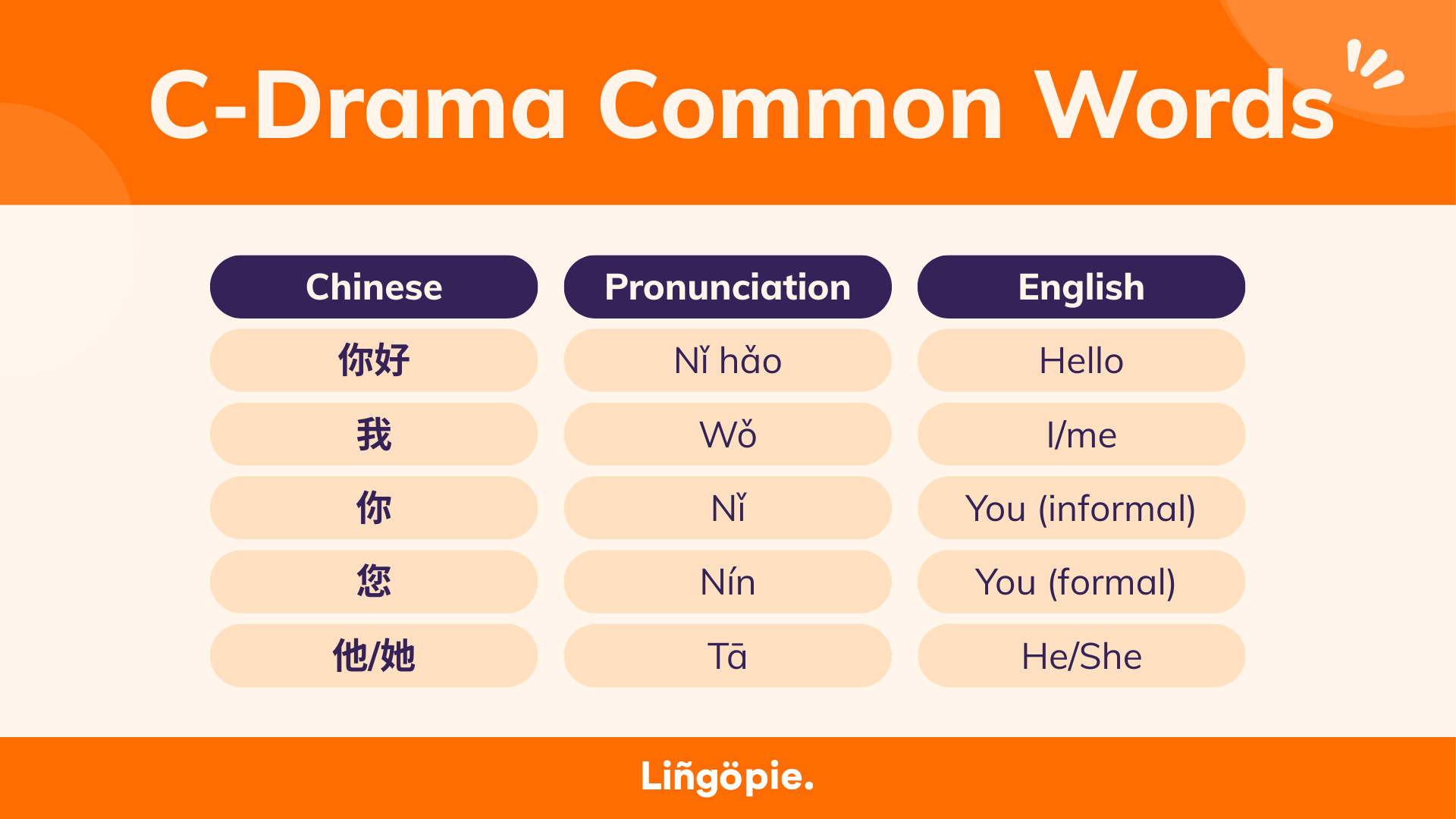
Greetings & Basics
- Nǐ hǎo (你好) - "Hello" - The most basic greeting you'll hear in any show
- Wǒ (我) - "I/me" - Characters use this constantly when talking about themselves
- Nǐ (你) - "You" - Used when speaking to one person (informal)
- Nín (您) - "You" (formal) - Used to show respect, especially in historical dramas
- Tā (他/她) - "He/She" - When talking about other characters (写作不同,发音相同)
- Xièxiè (谢谢) - "Thank you" - You'll hear this one all the time!
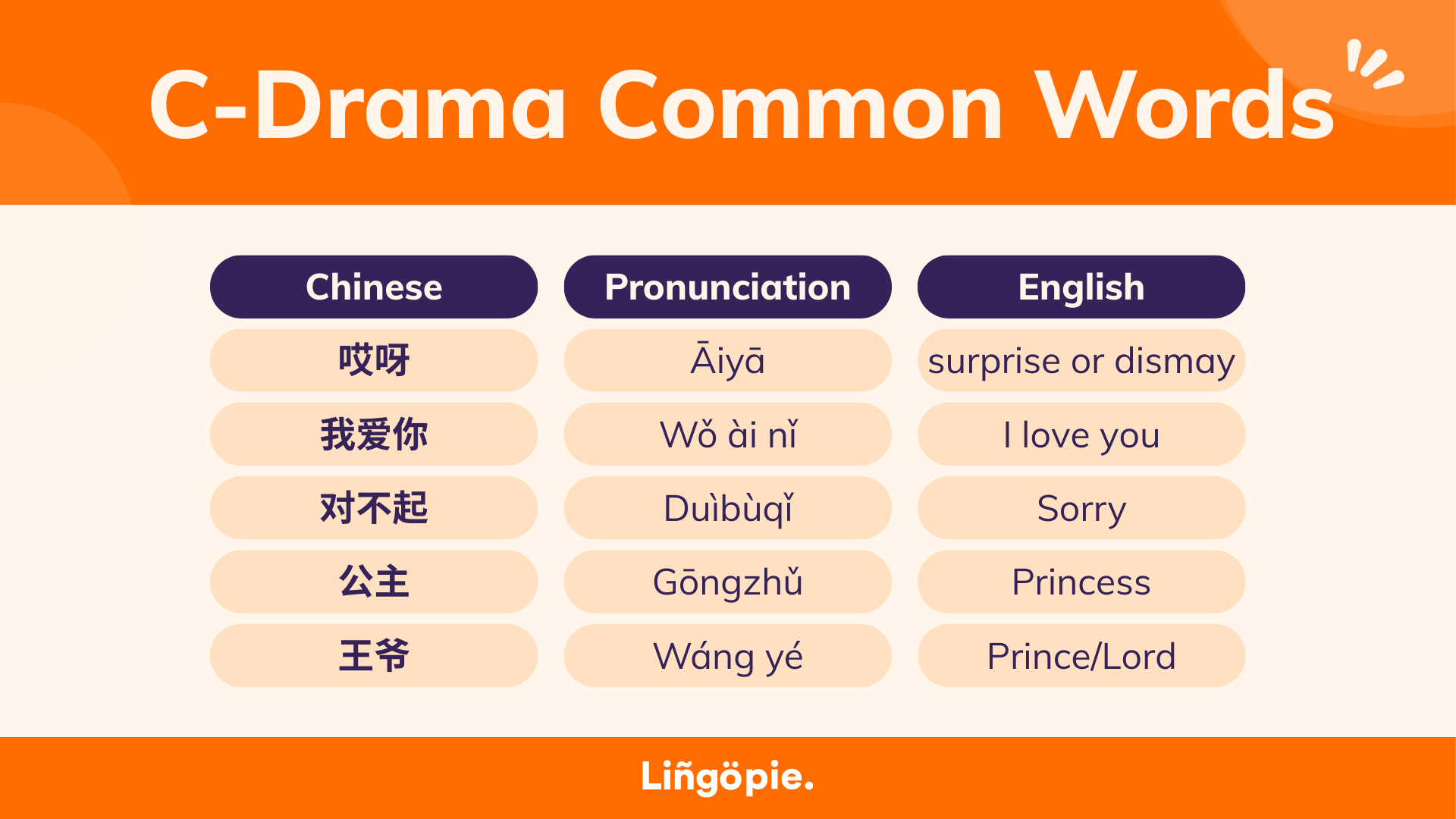
Drama Favorites
- Āiyā (哎呀) - An expression of surprise or dismay - Characters say this constantly!
- Wǒ ài nǐ (我爱你) - "I love you" - The big romantic moment in any drama
- Duìbùqǐ (对不起) - "Sorry" - For those dramatic apology scenes
- Gōngzhǔ (公主) - "Princess" - You'll hear this a lot in "Yanxi Palace"
- Wáng yé (王爷) - "Prince/Lord" - Another common term in historical shows
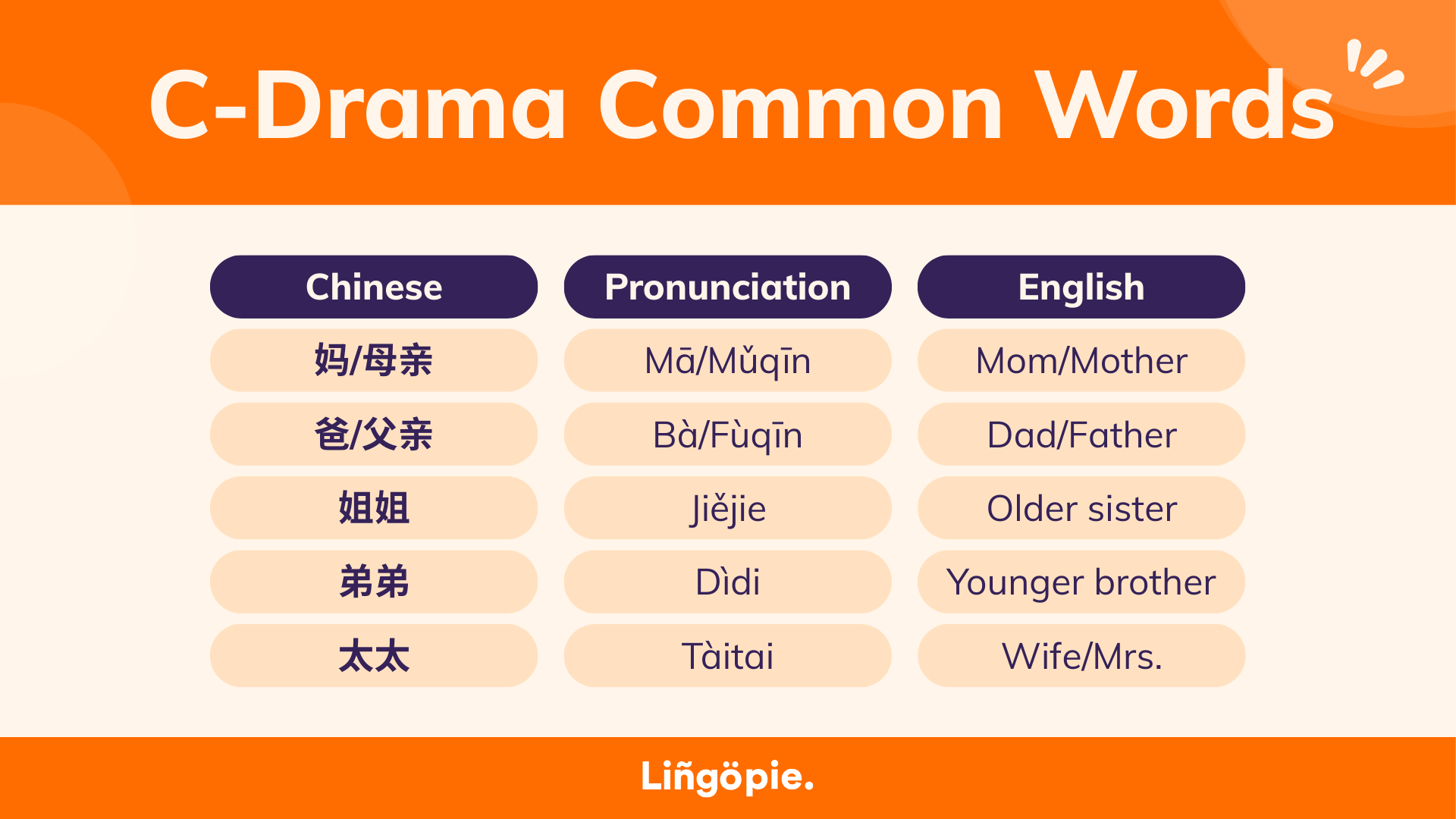
Family Terms
- Mā/Mǔqīn (妈/母亲) - "Mom/Mother" - Casual vs. formal ways to say mother
- Bà/Fùqīn (爸/父亲) - "Dad/Father" - Casual vs. formal ways to say father
- Jiějie (姐姐) - "Older sister" - Used for actual sisters or older female friends
- Dìdi (弟弟) - "Younger brother" - Same for younger brothers or male friends
- Tàitai (太太) - "Wife/Mrs." - Especially common in modern dramas
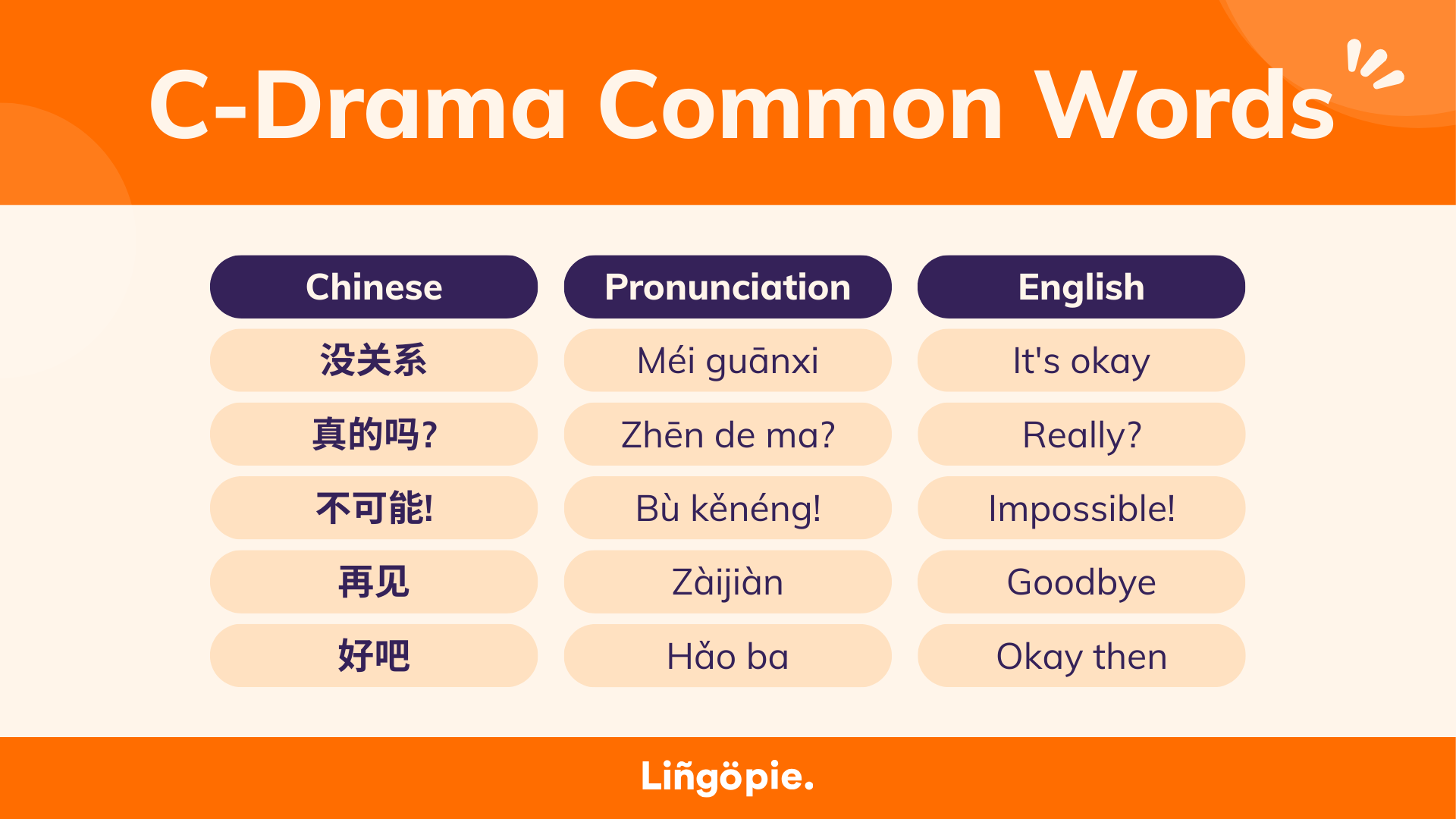
Useful Phrases
- Méi guānxi (没关系) - "It's okay/No problem" - Used to reassure someone
- Zhēn de ma? (真的吗?) - "Really?" - When characters are surprised
- Bù kěnéng! (不可能!) - "Impossible!" - For those dramatic revelation moments
- Zàijiàn (再见) - "Goodbye" - When characters part ways
- Hǎo ba (好吧) - "Okay then/Fine" - Often said with a sigh of resignation
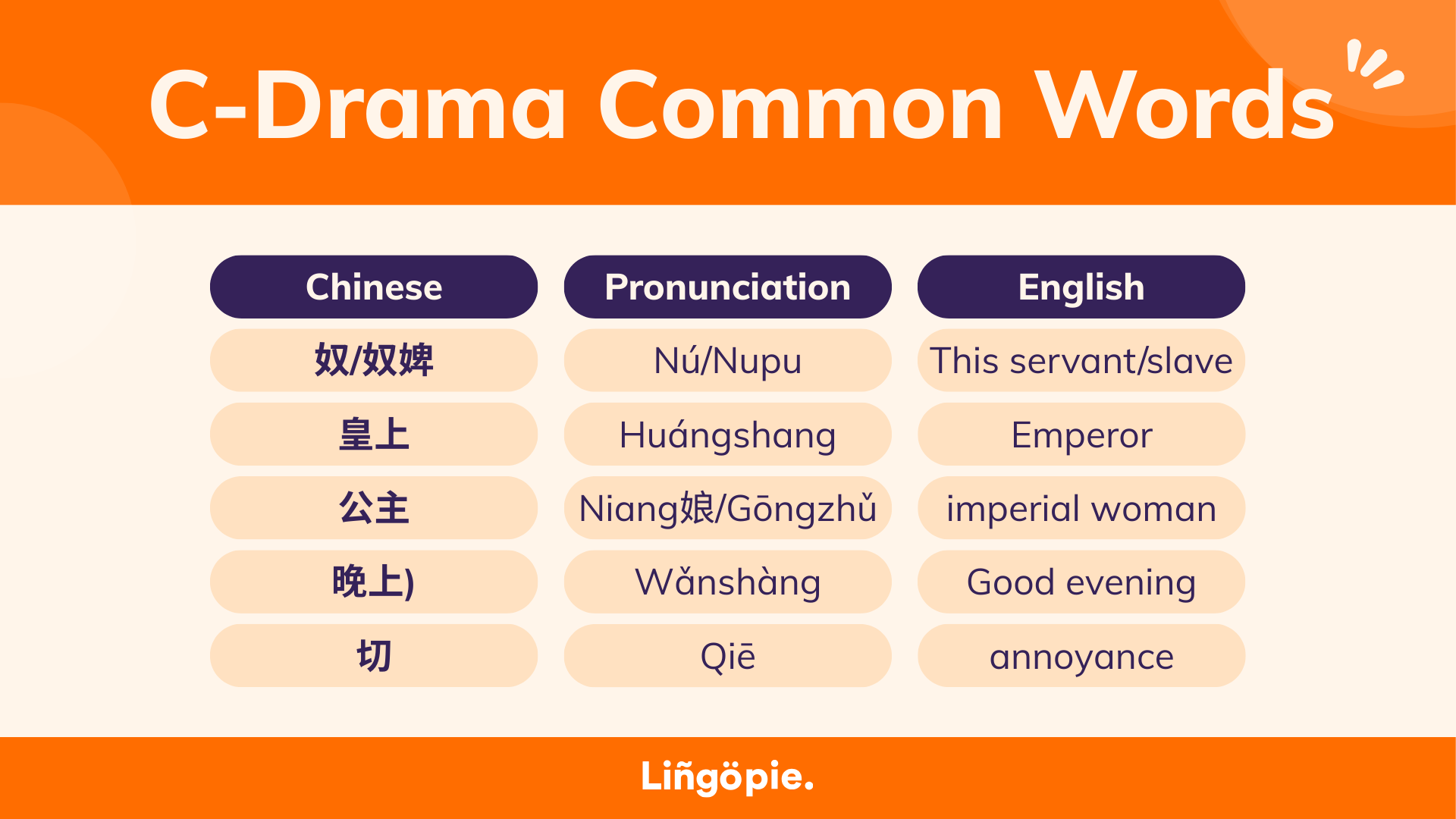
Historical Drama Terms
- Nú/Nupu (奴/奴婢) - "This servant/slave" - How servants refer to themselves
- Huángshang (皇上) - "Emperor" - How people address the emperor
- Niang娘/Gōngzhǔ (公主) - Terms for princesses and imperial women
- Wǎnshàng (晚上) - "Good evening" - Similar to "greetings" in formal settings
- Qiē (切) - An expression of annoyance/dismissal - For those sassy character moments
Keep an ear out for these words, and you'll be amazed how quickly you start recognizing them!
Why Learn Chinese Through Dramas?
Ever tried to learn a language from just textbooks? Boring, right? Chinese dramas make learning this Asian language way more fun and effective! Here's why:
- You hear real conversational Chinese, not just stiff textbook phrases. People in dramas talk like actual Chinese speakers do in everyday life.
- You pick up cultural context along with the language. The way characters address each other, celebrate holidays, or handle conflicts teaches you the “unwritten rules” of Chinese culture.
- The emotional moments in dramas help new words stick in your memory. When a character confesses their love or has a dramatic showdown, those phrases are way more memorable than random vocabulary lists!
Plus, watching episodes in short chunks with Lingopie is perfect for steady progress. Just 20-30 minutes a day adds up fast, and you’ll be too entertained to notice you’re studying!
Ready To Learn Chinese While Having Fun?
Watching Chinese dramas can make language learning feel like a treat, not a chore. If you’re streaming on Netflix, you’ll get plenty of exposure to authentic Mandarin and great storytelling. But if your goal is to truly learn the language, Lingopie’s platform gives you more than entertainment — it turns shows and movies into interactive lessons.
With Lingopie, you’ll be surprised how quickly your Mandarin improves thanks to tools like dual subtitles, instant translations, and built-in review features. Whether you’re into sword fights, love stories, or modern dramas, Lingopie’s curated catalog is designed to help you learn while enjoying authentic content.
FAQs About Learning Chinese Through Dramas
Do I need subtitles when I'm starting out?
Absolutely! Subtitles are your best friend in the beginning. With Lingopie, you can watch with both Chinese and English subtitles at once, and tap any word to see its meaning instantly. Over time, try switching to just Chinese subtitles to challenge yourself. The goal is progress, not perfection from day one.
How do I deal with different accents in Chinese dramas?
Mainland Chinese shows usually feature standard Mandarin (普通话), while Taiwanese dramas have slight accent and vocabulary differences. Beginners may want to stick with one type at first. Lingopie makes this easier by letting you compare words across contexts, so you can adapt naturally as you explore both.
Should I try to learn every new word I hear?
Not at all! That’s a recipe for burnout. Focus on the phrases that come up often or are most useful for your daily conversations. Lingopie allows you to save specific words and review them later, so you can learn at your own pace without feeling overwhelmed.
How long will it take before I understand without subtitles?
It varies by learner, but with consistent practice (around 30 minutes daily), many people start catching simple phrases after 2 to 3 months. Even advanced learners rely on subtitles for historical dramas with highly specialized vocabulary. The key is regular exposure and steady progress.
What should I do when characters speak too fast?
Don’t worry — fast dialogue trips up even native speakers sometimes! Lingopie has a replay feature to rewatch tricky lines, and you can slow playback speed for clarity. If you’re new to Mandarin, try slower-paced historical dramas first, then work your way up to faster modern shows.





![Lingopie Login: How to Sign In to Your Account [Guide]](/blog/content/images/size/w1200/2026/01/Lingopie-Login.jpg)



